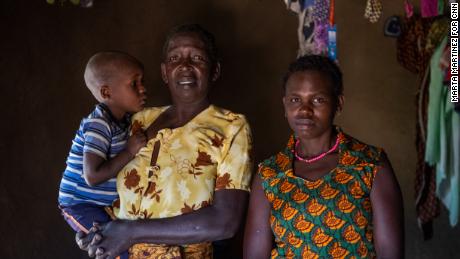Why is it so strange to get married and keep my surname in 2021?
Updated 1059 GMT (1859 HKT) August 6, 2021
Aisha Salaudeen is a CNN producer based in Lagos, Nigeria. The views expressed in this commentary belong solely to the author. Read more from As Equals. For information about how the series is funded and more, check out our FAQs.
Lagos, Nigeria -- The women at the immigration counter thought I was crazy.
"I still don't understand why you won't use your husband's name," one of them said, pointing to the section of a form where I had indicated my marital status.ŌĆ»ŌĆ»
"Because it is his name, not mine," I replied, completely taken aback by this unsolicited opinion.
Unfazed by my blunt response, the questions about why I so stubbornly was choosing to keep my birth name continued for about 15 minutes.
I should have been shocked by the topic of discussion, but I wasn't. I got married in October 2020, and as soon as the fuss from the ceremony died down, I was faced with a barrage of questions from friends and family about when I planned to adopt my husband's last name.
On some occasions, I found myself being queried by strangers -- like the immigration officers whose sole remit was to renew my Nigerian passport.ŌĆ»
Yes, it remains common practice for women to take on their husband's surnames when they get married, but around the world, as in Nigeria where I was born and raised, there's no law that makes it compulsory to do. It's simply the status quo -- but not one that I'm the only person frustrated with, as I learned after a tweet about my experience went viral.
So, what's in a name?
The reasons women adopt their partner's names of course differ. Some women don't like their birth names and can't wait to trade them in.
Others, aware of the laws that make it difficult to travel with minors who don't bear your surname, make the change so they shared the same name with their children. In South Africa, for example, even when not divorced or widowed, a parent wanting to travel with a minor is required to present a slew of documents.
More women still are going double-barrelled -- opting to hyphenate their last name.
I chose to keep my birth name because I like it. It is the name I've had my entire life. All of my career highs and lows are associated with my name; my achievements, failures, and experiences are all contained in this name.
Whatever an individual's motivations, it's important to understand the origins of this practice before citing "tradition" as the reason to insist on it continuing.
I am a Yoruba woman from western Nigeria. In his 1921 history of the Yoruba "from the earliest times to the beginning of the British Protectorate", the Reverend and historian Samuel Johnson described how Yoruba people's names primarily served as a way to identify the individual, their lineage and family totem -- the latter sometimes understood to be the ancient god of the family. As Johnson put it: "a married woman cannot adopt her husband's totem, much less his name".
Instead the Yoruba are named using descriptors such as the circumstances of their birth, the name given to them by grandparents or parents, or their praise name, a name, usually heroic, that expresses what a child is hoped to become. Later, a name that described the person's work may be added.
It wasn't until British colonization, which began some two centuries ago, that this naming system slowly crumbled.
Interestingly, surnames were themselves not common in England until the 13th century, and even then they were considered less important than "Christian names". It has been documented that at this time, "in some cases, especially in the upper classes, men took the surnames of their wives."
Then, as Deborah Anthony writes in the Columbia Journal of Gender and Law: "English women underwent an extended period of decline in rights and status, with the most pronounced and abrupt shifts taking place in the early modern period," beginning about the middle of the 17th century.
It was the conventions and norms of this time -- "upon marriage the identity of the wife was merged with that of her husband" -- that were introduced in all the Empire's colonies.
Elsewhere, in predominantly Muslim societies such as in Malaysia or Iran, women don't usually change their names after marriage -- in line with Islamic text. Chapter 33 of the Quran mentions that it is "more equitable in the sight of Allah" for Muslims to be called by fathers' names.
Keeping up appearances
Research published at the end of 2019 by academics in the UK and Norway noted that even "in an age of women's emancipation," "marital surname change is a striking example of the survival of ... a practice emerging from patriarchal history."
Its authors found two broad reasons women continue to change their names even in societies where they imagine themselves to be otherwise emancipated.
The first was because it was simply accepted that this is what you do ("taking tradition for granted") and the second: "doing and displaying family" -- the idea that carrying your husband's name was symbolic of the new family unit, and keeps any future children from becoming dejected or confused as a result of having parents with different names -- though there is no evidence to support this fear.
Societies often label women like me who choose to go against the norm as disobedient or defiant. But I am not interested in being either of these things.
I simply want to bear the name I've chosen without judgment. I want to continue on this journey with the name I have so far traveled; the one that has won awards and made mistakes.
If the women at the immigration office see this as an act of rebellion, so be it.




